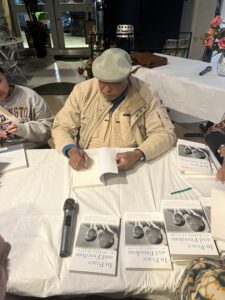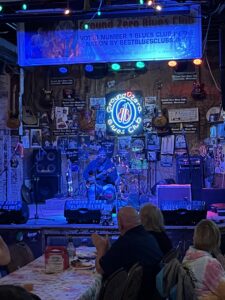A Story of Growth from the South
Guest Post By: Dhruval Shah, a Foster MBA Candidate. He is a Global Business Center Study Abroad Scholarship Recipient, and he studied abroad through the Race, Culture, and Immersion Trip to the American South, during Spring Break 2023.
Having done a classic European study abroad during my undergrad and always running short on time with the Evening MBA program, participating in a MBA study tour was never on my priority list when I started out with the MBA journey. However, my feelings about this changed when the Race, Culture, and Business (RCB) study tour was introduced during my first year because it was different than all the other programs. I did not get to go in the first year but given everything I had heard from the first RCB cohort, I was even more determined to go on the 2023 trip.
Having grown up in India and moved to the US during high school, I was initially unaware of much of the history of this country. I took history classes during high school and even during college, but it wasn’t until the death of Trayvon Martin in 2012 that I really started learning about the racial disparities in our society. I went to college in Atlanta, which has a relatively higher African American population and a lot of black history, culture, and museums – but without making an effort, it seemed like it was hard to get exposed and learn about black history, especially while I was busy with college.
Participating on the RCB Immersion was somewhat of a homecoming for me. I was very excited to be back in the South, where I had spent my formative years in college, because it would bring back the familiar smells of the southern air and the southern food, and the familiar sounds of different genres of music from the south. While I was looking forward to the food and music, I also knew that the trip would have a good amount of emotionally challenging moments. These moments – most notably the Emmet Till episode in the Mississippi Delta and EJI Museum in Montgomery – were tough, but they were also some of the richest experiences of the trip. I took a lot out of these experiences – lessons in humility, resiliency, patience, and love – which are I am sure will be very helpful in my growth as a leader.
 Another experience I recall is with Bernard LaFayette, Jr. who played a pivotal role in organizing the march to Selma with John Lewis. While it was an honor being in the same space with someone like him, the most interesting takeaway for me was that he was at such an ease talking about such dark history of his community. I got to ask him if he finds it challenging to talk about his experiences and his response was simply “once you have been in the tough situations, they thicken up your skin enough to make you resilient. Besides it’s important to pass on the true account of history to the future generations”. This was especially enlightening to me, because it helped me realize that the history I had been learning on this trip, as told by living legends like Bernard LaFayette, Jr. was very different from the history I had read in my high school and college textbooks. It almost felt like we as a country are trying to hide our dark past. Whenever I searched for “things to do” in the different cities we visited, only some, if any, sites that we visited actually came up – which further went on to show that we as a country need to accept the dark history and make sure everyone learns about it. Having spent a summer in Germany during my undergrad learning a lot about their dark history, I couldn’t help but continue to draw parallels with that. At this point, it came to me that the reason why a lot of students do not get exposed to a lot of the black history that has existed around them is because we tried to hide it – much like the experience I had in Atlanta while I was in college.
Another experience I recall is with Bernard LaFayette, Jr. who played a pivotal role in organizing the march to Selma with John Lewis. While it was an honor being in the same space with someone like him, the most interesting takeaway for me was that he was at such an ease talking about such dark history of his community. I got to ask him if he finds it challenging to talk about his experiences and his response was simply “once you have been in the tough situations, they thicken up your skin enough to make you resilient. Besides it’s important to pass on the true account of history to the future generations”. This was especially enlightening to me, because it helped me realize that the history I had been learning on this trip, as told by living legends like Bernard LaFayette, Jr. was very different from the history I had read in my high school and college textbooks. It almost felt like we as a country are trying to hide our dark past. Whenever I searched for “things to do” in the different cities we visited, only some, if any, sites that we visited actually came up – which further went on to show that we as a country need to accept the dark history and make sure everyone learns about it. Having spent a summer in Germany during my undergrad learning a lot about their dark history, I couldn’t help but continue to draw parallels with that. At this point, it came to me that the reason why a lot of students do not get exposed to a lot of the black history that has existed around them is because we tried to hide it – much like the experience I had in Atlanta while I was in college.
 As part of the trip, we also got to participate in a lot of fun activities with a spin of black history associated with them. We got to visit the town of Clarksdale in the Mississippi Delta which is the birthplace of Blues. This was a revelation for a lot of us not only because we got to see tourists from around the world in town visiting the local bars and enjoying the music, but we also got to stay in a really unique hostel owned by a Swedish woman. The town also had a lot of beautiful art and some great food. We got to visit “Ground Zero Blues Club” for our dinner and live music, which as we later learned was owned by Morgan Freeman. At the end of our trip, we visited the historic Paschal’s Restaurant and Bar in Atlanta which was one of the first places in the city where both black and white customers were welcomed and was also a very prominent meeting places for leaders such as Dr. Martin Luther King, Jr. during the Civil Rights Movement. At this restaurant, we did our Stax Fest, which was an homage to the Stax Museum that we visited in Memphis, TN earlier during the trip. We did our Stax Fest in the form of a talent show where the students and the leadership team participated to showcase their talent. This was a perfect end to the trip as we recounted a lot of the memories from the trip – both with laughter and tears – in a restaurant with so much history.
As part of the trip, we also got to participate in a lot of fun activities with a spin of black history associated with them. We got to visit the town of Clarksdale in the Mississippi Delta which is the birthplace of Blues. This was a revelation for a lot of us not only because we got to see tourists from around the world in town visiting the local bars and enjoying the music, but we also got to stay in a really unique hostel owned by a Swedish woman. The town also had a lot of beautiful art and some great food. We got to visit “Ground Zero Blues Club” for our dinner and live music, which as we later learned was owned by Morgan Freeman. At the end of our trip, we visited the historic Paschal’s Restaurant and Bar in Atlanta which was one of the first places in the city where both black and white customers were welcomed and was also a very prominent meeting places for leaders such as Dr. Martin Luther King, Jr. during the Civil Rights Movement. At this restaurant, we did our Stax Fest, which was an homage to the Stax Museum that we visited in Memphis, TN earlier during the trip. We did our Stax Fest in the form of a talent show where the students and the leadership team participated to showcase their talent. This was a perfect end to the trip as we recounted a lot of the memories from the trip – both with laughter and tears – in a restaurant with so much history.
As I look back and reflect upon the 8 days in the south, I see a lot of growth in myself – not just in the knowledge and reckoning with our dark history, but also a lot of personal growth in meaningful listening and dealing with stressful situations. Sankofa Impact did an amazing job at packaging a lot of different experiences in the limited time we had while also making sure that we form a community and develop deeper relations with our cohort. I am grateful that I had an opportunity to participate in this study tour that is unlike any other, and certainly hope that I can use the knowledge and the growth that I have had to positively impact the community around me!
